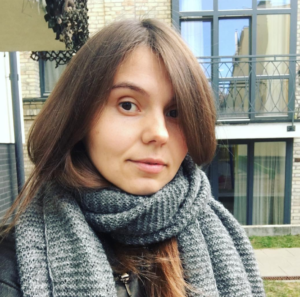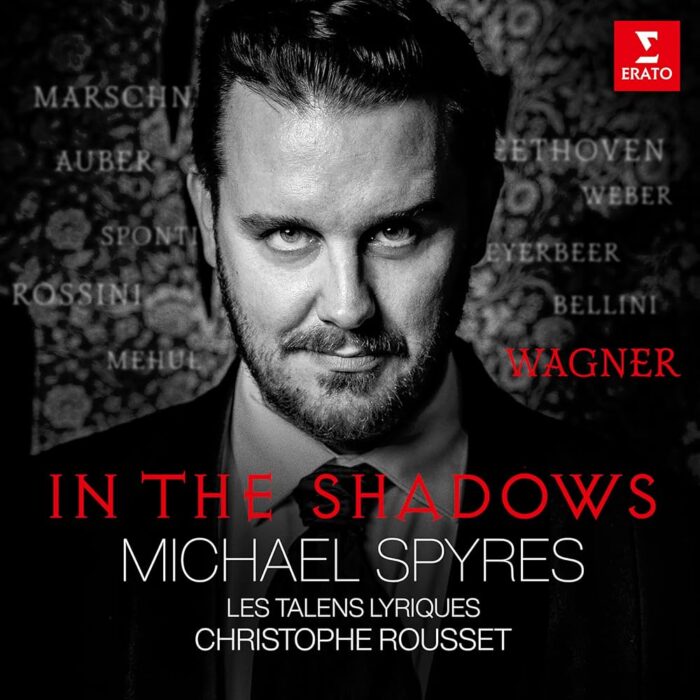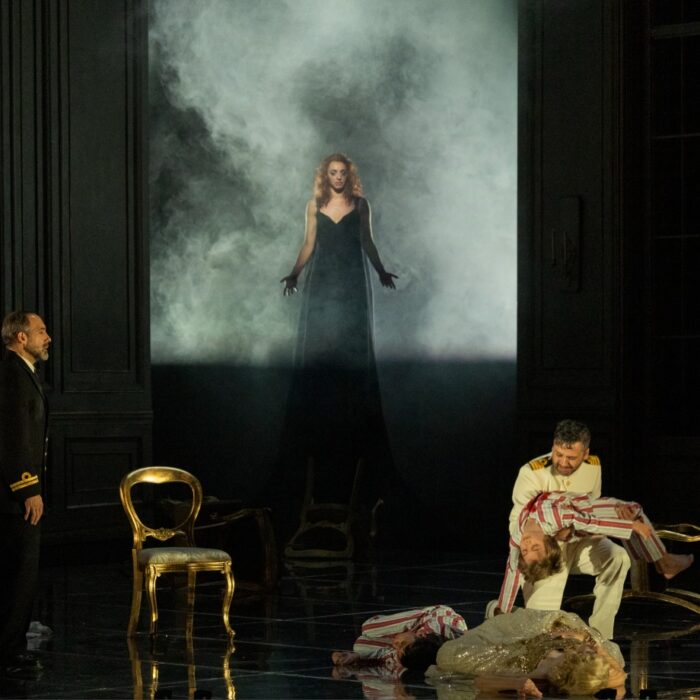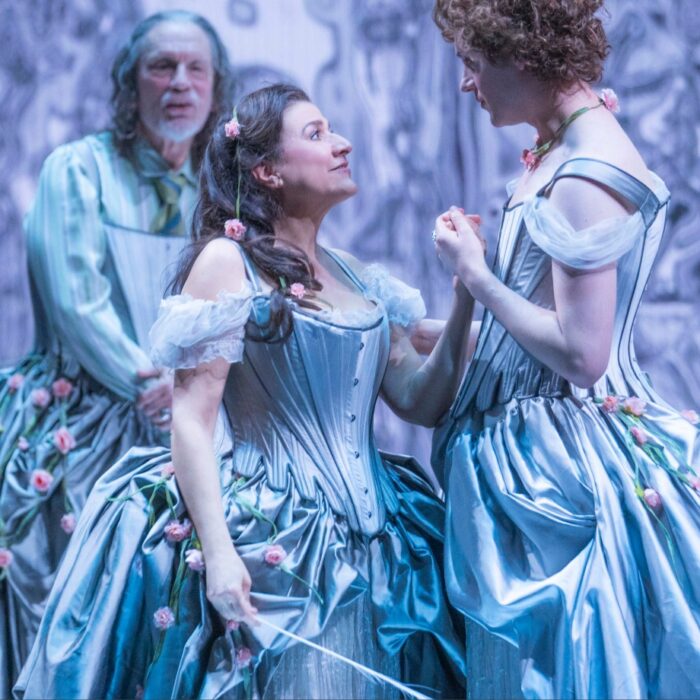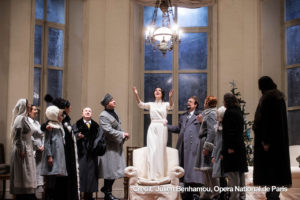
Opera National De Paris 2018-19 Review: Iolanta
Silver Age Of Russian Culture At Palais Garnier
By Polina LyapustinaA few facts you need to know before reading this review:
- Russian opera is something extremely different.
- Such operas are just perfect for diversifying a repertoire of any European or American opera house.
- The main reason you might not like Russian opera is an incorrect performance.
- You need to be a Russian native to understand if it sounds correct.
- You don’t need to be a Russian native to feel it.
- I’m a Russian native.
At the end of the 2018-19 season, the Opéra National de Paris held a long (9 performances in 15 days) run of “Iolanta,” paired with “The Nutcracker.”
Opéra Garnier is a perfect place for such performances. You can feel the magic already on its steps. You are getting inside, walking in the small galleries, watching beautifully painted ceilings — and you feel prepared for more magic and more beauty. “Iolanta” is obviously the opera, that can bring all of this.
But also, this opera is the one, that being performed incorrectly, could ruin the magic of the entire evening. It happened recently at the Met, and it wasn’t the first time nor would be the last time. The thing is, that the usual approach doesn’t really work with “Iolanta.”
The key to the success of this opera is not a genius conductor and not even a beautiful Romantic source. It’s neither strong dramaturgy. So, how to bring an astonishing performance of a short Tchaikovsky’s masterwork?
What you need the most is a very particular, even personal understanding of this piece. And then, you need to be a bit Russian. Not modern, but the one from times, which we call “Silver age of Russian culture” — the miraculous times before the Revolution, when “Iolanta” was composed.
And then, there are just a few points which make a perfect performance.
1. The fairytale
“Iolanta” is very simple, as well as absolutely illogical — the combination of these two properties creates special magic. But an opera which doesn’t require a particular historical and social context is a great temptation for the director to set it in different times and circumstances, growing it more serious, more massive. And I’ve never seen a single good attempt of it.
Fortunately, director Dmitri Tchernuakov has chosen another course for his production — using classic (or better to say simple and timeless) interior, he reduced the entire operatic space to the single room with two doors and a window (all in use), and even if this set was reasonably challenging, the director managed to find some extra opportunities to spice up the show.
2. Sweep The Introduction Under The Rug
Can I say it loud enough? An introduction composed exclusively of wind instruments is rather challenging. Such instrumentation caused bewilderment among the composer’s contemporaries, who undoubtedly had the right to comment on this matter. Though today no one criticizes it, I would still prefer if it is to be played, then at least to be distracted by something.
In this production, it was decided to use the weakness on this piece to highlight the weakness of the title character. So, Iolanta comes on stage, literally crashing into furniture in the house where she has been living since birth. And considering that the entire performance was be held in this room, it looked extremely unconvincing. But, I’ll note with pleasure, this moment will remain the weakest.
3. The First Scene
The first scene is truly important. It introduced the title character and other females, and allows them an amazing and very beautiful opportunity to sing their parts and tell us about the whole story of Iolanta. This part is very calm and consistent, yet it contains some emotional climaxes. And the whole scene — the longest in this opera — is a team game, where the title character doesn’t sound dominant, and this sets a base for her character development during the opera. That is why Iolanta needs strong support for the first part, and really strong voices are required for the roles of Marta, Brigitta, and Laura.
The female casting for this performance deserves all the praise. Elena Zaremba as Marta performed with her dark, but flexible contralto, combining with great artistry. Soprano Adriana Gonzalez proved again that there’s no such thing as a small role, and her Brigitta was not just a supportive voice, but a bright vocal line in her every part and ensemble.
The Chorus, placed in the orchestra pit, sounded clean and balanced, creating a perfect background for singers, and remaining very fair sounding and almost transparent.
4. King René
The role of a King I would call the dominant vocal line of the entire opera. His arias explain and justify the miserable fate of Iolanta. Those pieces were composed by a true genius, with great love in them, so King René remains among the most beloved characters, despite his controversial decisions.
After two cancelations, this role was given to the young Polish bass Krzysztof Bączyk, who had just a few days to prepare. He didn’t sound overly confident at the beginning, but later he managed to act and sound almost right. His tops were under perfect control, and his legatos were elegant. So eventually, in the famous aria “O Lord, if I have sinned” he even coped with his pronunciation in Russian.
Although he couldn’t become a perfect King René, Krzysztof Bączyk did a good job in comprehending this role.
5. A Male Bond
“Iolanta” gives us a rare chance to see a male friendship with (almost) no drama. Two notably different young men find themselves in quite unusual circumstances. And one is here to represent himself, another one to grow. And the emotional development of these characters in a very short period is one of the true gems of this opera.
Baritone Artur Ruciński is very well-known and acclaimed for his interpretation of Enrico Ashton in “Lucia di Lammermoor,” but on this evening he changed the mask. He was enamored and funny, and just show-stopping as Duke Robert. His only aria “Who can be compared with my Matilda,” with high tessitura, was perfectly sung, and his artistic performance, with support of Dmytro Popov, was a gem of the show. He even had his personal curtain call (with the window curtains) and well-deserved applauds after his aria. that is a rare case in the Opéra de Paris.
An extremely bright character of Duke was performed just for the sole reason — to shade his sincere, gentle, and honest friend — Count Vaudémont. And their chemistry worked out perfectly. In the beginning, you can not even notice the Count, who acted and sang very discretely alongside his blithesome friend. Dmytro Popov was so natural and convincing, that I even started to worry if his voice peak has passed since I heard him in February. But the only reason for my concern was for sure my own expectations on his voice, not the particular role. And once the Count was left alone in uncharted territory, his voice fully shone.
6. Iolanta
The title character of this opera is one of the most challenging parts in Russian operas. It has a high tessitura, it requires vocal flexibility, sometimes the voice emerges out of nowhere, and climaxes are frequent and sharp. Iolanta has amazing vocal lines in ensembles and her soprano has to overcome all singers confidently. But at the same time, she needs to display all the colors of youth and naivety in her voice. Yet the character is completely immature and innocent; Iolanta is not a role for young sopranos.
I bet, no one could even imagine what an outstanding performance Moldavian soprano Valentina Naforniță would bring. In a little longer than an hour she showcased impressive character development between the naive and submissive child in the first scene and the young woman who is ready to suffer and to overcome her deepest fears for her beloved.
Her voice shone out with many different colors. Iolanta’s famous arioso in the first scene was a big moment when she showcased youthful energy locked inside by her limited perception of life. And then, this energy was slowly released to reveal new facets of her personality — in comprehending love and gaining courage, and later exploded with the excitement of witnessing the skies.
7. A Love Story
The love scene in this opera has the most diverse range of emotions that a couple could experience in barely 20 minutes. Adoration, confusion, fright, sadness, pity, and finally tenderness and love — all there. Vocal flexibility plays a unique combination with moments of silence.
The romantic scene was Dmytro Popov’s finest hour. He was in splendid voice and sang with gentle, yet big and well-focused sound. His performance in love duets was heartfelt. With the bright and agile soprano of Naforniță, they made a perfect couple. Despite having completely different timbres, the two matched their voices as if melded into one.
The tenor also managed all the vocal shifts required for this role, so when with Iolanta he was all about tenderness with a touch of confusion. In the duet with the king, he reduced the sensitivity but increased the richness.
8. A Philosophy
Tchaikovsky’s romantic fairy tale obviously has a moral. And the voice to manifest this idea belongs to Moorish physician Ibn-Hakia. He is the one to explain the interdependence of the mind and the body within the universe, which merges spirit and matter. And the whole subsequent performance was created to display what it means.
Johannes Martin Kranzle as Ibn-Hakia, unfortunately, couldn’t stand for his ideas. Though his singing wasn’t bad, he definitely paid more attention to acting, than his concept. It even seemed like he couldn’t understand his own words. With his poor pronunciation, he couldn’t keep the focus on value as, he tried to bring to Iolanta’s life. And during Ibn-Hakia’s main monologue “Two worlds,” he was simply unintelligible.
9. A Stumbling Block
“The hardest language to sing in,” Russian has a bigger problem than a sophisticated grammar and pronunciation.
“Everyone in Eastern Europe knows Russian for sure” it’s called.
An important note — this is not true.
English, Spanish, French natives often sing in Russian better than Polish or Lithuanian, just because the production team decides that Eastern Europeans don’t need proper language coaching.
Another important note — they do.
Besides the crucial problem with Ibn-Hakia, I would call this performance a success language-wise. This time, Opéra de Paris had the main cast almost entirely consisting of Russian speaking singers. There were also two young Polish artists. I want to pay another tribute to Artur Ruciński, who is not a native speaker, but the way he formed the sentences sounded so natural that even if he was wrong in some sounds, it never ruined the clarity. It was definitely harder for Krzysztof Bączyk, but the more he sang, the more natural he sounded.
“Iolanta” at Palais Garnier left some wonderful but separate impressions in my memory, while the whole picture was not so perfect. There was a “Silver age” and something incomprehensibly Russian, wonderful voices and great artistry, interesting set solutions, and dramatic moments.
And yet it lacked some magic. Perhaps it was the maestro Tomáš Hanus, who was a little passive with the orchestra. Or even the director Dmitri Tcherniakov, who paid more attention to building a connection between “The Nutcracker” and “Iolanta” than he did in getting each one right individually. Bits of reality broke into the performance and spoiled the magic feeling in this beautiful staging, though just a little.
P.S. About An Elephant In The Room
Speaking of combining the two operas, Tcherniakov obviously took the idea of combining two pieces way too seriously. At the beginning of “The Nutcracker,” we found that the opera was just a performance at the birthday party of Marie. This fact also explains why Marie appeared on stage several times during the opera performance and justifies the interval, which separated the last scene of one-act “Iolanta” to connect it with the ballet. But this only confused theaudience.
The decision to weave two pieces together also affected the set. Pushed back deep into the stage, the room obviously reduced the volume coming out to the audience. The screen, meant to protect the orchestra pit and the auditorium from the ashes falling down during the ballet, also didn’t improve the flow. So even if the set technically allowed for the two pieces to be performed together, it didn’t really allow of either of them to be any better.
